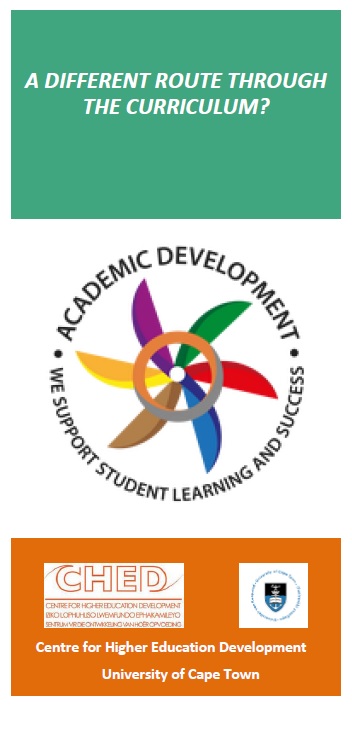Alternative routes through the curriculum
[Click on the image to access brochure contents]
Our most widely used and successful strategy for fostering access and success is a curriculum model which offers students an alternative route to their qualification. The alternative curriculum usually takes between six months and a year longer than the standard route and is therefore often referred to as the ‘extended curriculum’. It is important to note that the degree (the end qualification) remains the same, whether a student follows an extended or standard route through the curriculum. The alternative routes merge with standard curriculum routes during later years of study.
The extended curriculum offers a more supported path than the standard curriculum, especially by offering extra academic and psychosocial support in the first two years of study while students are still getting used to studying at university. Our courses offer students extra materials, more time in class, smaller classes, more time to practise new or difficult materials or skills and more contact outside the classroom.
The extended curriculum varies from faculty to faculty. First year students may be selected, advised, or may choose to go on to an extended curriculum depending on the faculty. There are different admissions criteria and the point in time when students can enter the extended curriculum also differs from faculty to faculty. In some faculties students can register on an extended curriculum from the beginning, while in other faculties they only start at a later stage during the first year of study. [link to pamphlet; pamphlet download]
- Credit-bearing courses, modules and stand-alone workshops
Several of our courses can also be taken on their own outside the extended curriculum. Many students on a standard curriculum opt to take individual courses from the extended curriculum because they realise that these courses will help them grasp essential content or skills (enquire from the relevant ADP unit offering the course if it can be taken independently). We also offer modules that are integrated in the curriculum and stand-alone workshops.
- Academic language and quantitative literacy
Our two units that work across the faculties, the Language Development Group and the Numeracy Centre, offer a number of credit-bearing courses, modules within other courses, or stand-alone workshops that develop students’ ability to use academic language, numbers and numerical concepts appropriately in their studies.
- Tutor training programmes
Most ADP units run tutor training programmes for first time as well as experienced tutors who work closely with undergraduate students in ADP courses and extended curricula.

